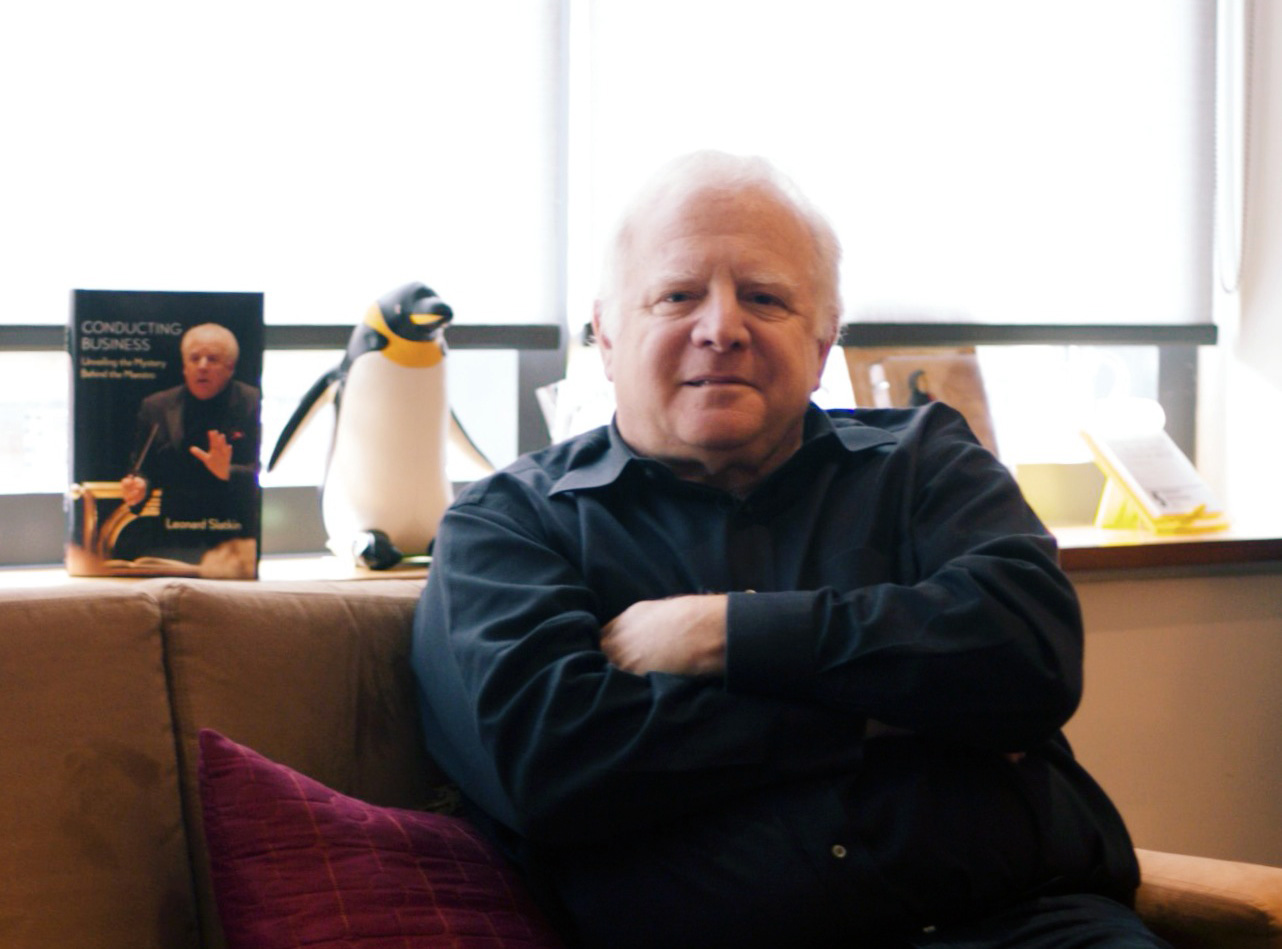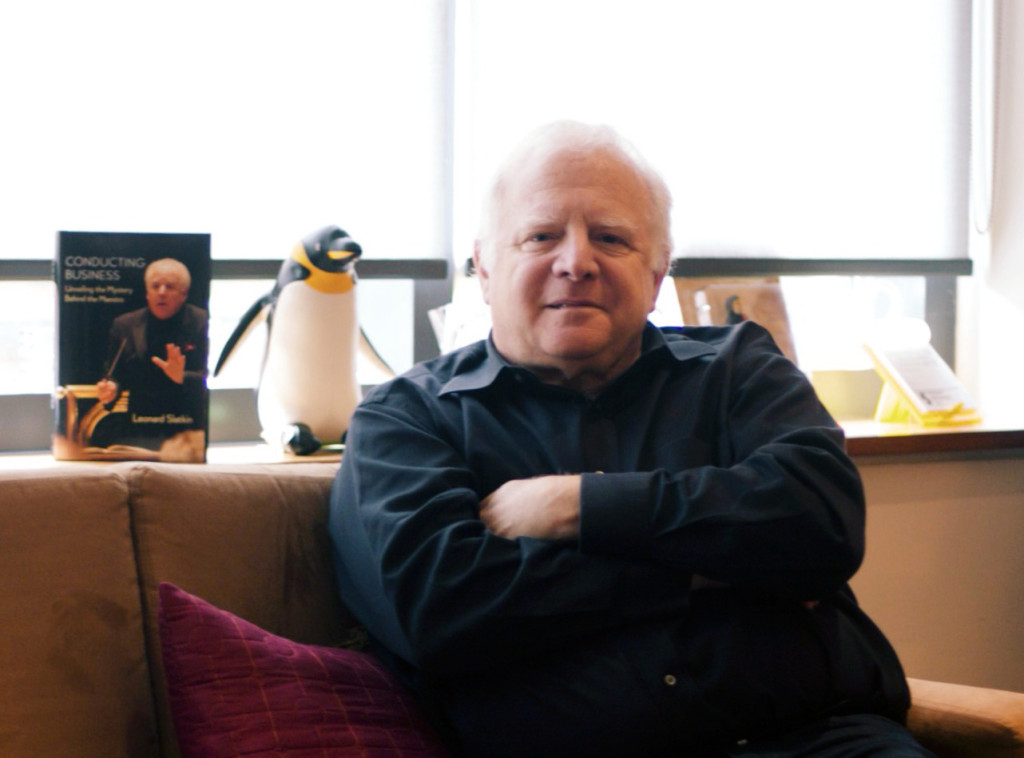Maestro Leonard Slatkin, conductor and music director of the Detroit Symphony Orchestra, is one of the city’s finest musical treasures.
Born into a family of professional musicians, Slatkin’s father, Felix Slatkin, was a Grammy Award-winning concertmaster for the 2oth Centry Fox Studio Orchestra, and a renowned conductor and violinist. His mother, Eleanor Aller, was an equally-talented cellist, playing with the Warner Brothers Studio Orchestra and performing with well-known film composers, such as John Williams. His parents were also the founders of the Hollywood String Quartet, supplying the rich soundtracks for films of the “Golden Age of Hollywood,” as well as performing alongside artists such as Frank Sinatra.
Maestro Slatkin’s own musical contributions have earned him seven Grammy Awards, and more than 60 nominations. He has worked with countless musical organizations around the globe, and has released recordings through RCA Records, EMI and Telarc. Slatkin’s book, “Conducting Business: Unveiling the Mystery Behind the Maestro,” received an ASCAP Award in 2013, and will be presented at the 45th Annual ASCAP Foundation Deems Taylor Award ceremony on November 14.
Maestro Slatkin spoke with Detroit Music Magazine at the DSO’s Orchestra Hall to discuss his musical heritage, the digital age of music and Detroit’s unwavering spirit.
________________________________________________________________________________
You obviously come from an extremely musical family. This profession seems to be in your blood.
It is. It goes well past my parents, at least on my mother’s side. Both sides came from Russia. They have proud musical traditions, of course. On my mother’s side we know it’s at least three generations. There’s my father. And my brother is a cellist. So, it’s very much a part of the fabric of having grown up in an atmosphere of all kinds of music. Not just film. Not just classical. Not just pop. We listened to, and played, everything.
Was that an expectation growing up? Like a family full of doctors encouraging their child to attend medical school?
No, in fact, quite the opposite occurred. My parents tried to discourage me and my brother, saying, ‘This is a very difficult life. To become a musician you have to sacrifice a lot.’ But, of course, we didn’t listen. And we’re here musicians.
Your brother actually changed his name. He changed it to the traditional spelling?
Well, we actually don’t know what’s traditional and what isn’t. Clearly, there is no such thing as Slatkin in Russian. What happened was, when my grandparents arrived at Ellis Island the immigration officer didn’t speak Russian. So he said, ‘What’s your name?’ The guy figured that out. And then when they said something the guy wrote down ‘Slatkin.’ So, whenever we asked our grandparents what our name was in Russia, they would say, ‘Our lives didn’t begin until we came to the States. We’re Slatkin.’ But my brother did some research, and he suspects that the literal spelling was ‘Zlotkin.’ So, he chooses to spell his name that way.
You began your career conducting at the New York Youth Symphony. What was special about that program?
Well, to start with – it was at Carnegie Hall. The grand temple of all music. And to walk out on that stage, where virtually every great – and probably, mostly not so great – people had appeared, was overwhelming. So, being able to do something, especially with a composer I admired – his name was William Schuman – there, was definitely a striking moment. That was one of the great moments. A year later I was appointed director of that orchestra.
You’ve worked in St. Louis, New Orleans, San Francisco, Cleveland, Nashville, Washington D.C., London, Lyon [France], Los Angeles, Pittsburgh… Why Detroit? What is special about Detroit? Is it Orchestra Hall? Is it the orchestra?
Certainly, each… and other things as well. When I guest-conducted about seven years ago, I hadn’t seen the orchestra in almost 20 years. I didn’t really think about it much, but it was clear they were looking for something of a music director, and they were going to be in the process of trying to succeed Neeme Järvi – who had been gone for four years. They had been rector-less for quite a while. I fell in love with the orchestra, with the hall – with the community. I knew that there were going to be difficult times ahead. Everybody knew it. It was no secret. One of the things I like to believe that I do fairly well is to manage situations when there is crisis. I like to think I manage pretty well when there’s not one, but I’m good at getting groups through difficult times. I also felt a spirit here. A kind of, ‘We’re not down and out at all. We’re going to survive this. We’re going to be a city that’s strong.’ And indeed, that is proving to be very much the case right now. Good vitality going on in virtually all areas. Yes, there are many problems that still have to be addressed. For the Orchestra and for the city, but that’s what we’re here to do. I love it here. I’m committed to this particular organization. I think we are one of the bright lights in a city that can use all the bright lights it can get right now.
Recently, the DSO performed some Danny Elfman music for Halloween.
Yes. The Tim Burton stuff.
Obviously, you have strong ties to Hollywood composition. Are these performances, with music from composers such as Danny Elfman and John Williams, a way to introduce classical music to listeners?
It’s a good point to some degree, but I don’t think we use it as an orchestra to say, ‘Okay, come to Danny Elfman and you are going to love hearing Beethoven.’ Not at all. It’s like saying to somebody, ‘Okay, you love Willie Nelson. Now go and hear Eminem.’ You never know. For some people, yes, they’re interested in many different kinds of music. All we can do is present a variety of music to the audience to which it caters. If there are people who cross over and want to hear different styles and different sounds – that’s fun. But I’m not concerned about that. Each music tends to find its own audience. So, really – the pops concerts and the special events we do attract a specific audience. I’m not concerned, whether they do, or don’t, come to other events. I’m just here to make sure that we present many different kinds of music, so that people have many options for their listening experience.
Music has taken a strong digital turn in recent years, with streaming, downloading and online releases. What has the classical music genre done to adapt to the direction of the music industry?
Well, the Detroit Symphony Orchestra has been at the forefront of this. We broadcast all of our subscription concerts, and others, on the Internet. We have recently gone very high-definition. I was able to watch half of the broadcast a week ago, maybe a week and a half ago. It looked terrific. It sounded good, and we will continue to improve on that. And I think one of the things we’ve realized here, is that the definition of the word ‘audience’ has changed in the 21st century. It’s no longer just people who are in the building. It’s people worldwide – people who have access to what we do. And that’s why we provide all of this. We’re the only orchestra that streams our season live, and for no cost to the public. We have even offered, as a digital download, all of our Beethoven symphonies. You don’t have to go into a store and buy them as a CD. You can go to the Detroit Symphony website and download them if you wish to have them. So, I think orchestras have to figure out other ways, as well, to adapt to emerging technologies. And you have to assume that technologies will continue to grow, and that they will change. The orchestras that stay in front of that are going to be the ones that do the best.
You have an upcoming performance, featuring a digitally-friendly piece called “Cyborg.” It’s paired with Mahler’s Symphony No. 4. Is this a natural pairing?
Well, there are three ways to do programming. You can do pieces that relate to each other throughout the course of the program, or you can choose to say, ‘It doesn’t matter.’ Or, in this particular case, you have three pieces of music that are so in contrast, that it’s the contrast that makes them hold together. Mahler is an ultra-romantic. In this particular piece, he is even dealing with a young person who’s died and is viewing heaven and Earth from the point of view of a child. The violin concerto is a virtuoso piece. It’s a show-off work for the soloist and is one of the staples of the repertoire. “Cyborg” is a first composition by Ferran Cruixent, a Spanish composer, to be heard in the United States. He’s a relatively young guy. I think about 36 or 37 – something like that. What he’s done, is write a piece where he wants to show how emerging technologies can be conjoined with what is a very traditional organization – the symphony orchestra. There are many, many unusual sounds that happen in this piece. The players are asked to speak. They are asked to sing. They are asked to play their instruments in unusual ways. But where the ‘cyborg’ implication comes from, meaning some form of creature that is part human; part machine, is that each orchestra member must download an MP3 file that the conductor has created, and near the end of the piece, they all press their phones and it’s played back on the stage as we continue to play other things. So, he’s introducing a communications device into the orchestra, showing this way that technology combines with what we do. He calls it ‘cyber singing.’ It’s fascinating. The real thing that makes this amazing, is that he’s not coming over for the performance, but he’ll be watching it on the Internet from Spain. And to think about that – that the composer has the chance to hear his worked played for the first time in the United States by using the very technology he’s writing about. That’s extraordinary.
It’s almost more appropriate than him actually being here.
In a way. It will be harder for him to take a bow, but I’ll give him one anyway.
[Laughs]
The thing for me is, we call ourselves ‘The Most Accessible Orchestra on the Planet.’ Not my slogan, but it’s there. And I really would emphasize that the idea is that we are here for everybody. If you look over the course of a year… the events we do – between playing in the communities, doing the popular concerts, bringing in various things to the hall, traditional music that we play, the broadcasts we do – I think more than most orchestras we are catering to a larger audience. Again, as I mentioned, it’s not that one group will necessarily come over to another set of styles, or a set of musical examples, but the fact is that we’re here to serve the entire community in as many ways as we can.
____________________________________________________________________________________________________
Listeners can stream Thursday’s performance (Mahler’s Symphony No. 4 and “Cyborg”) via the DSO’s streaming service.

